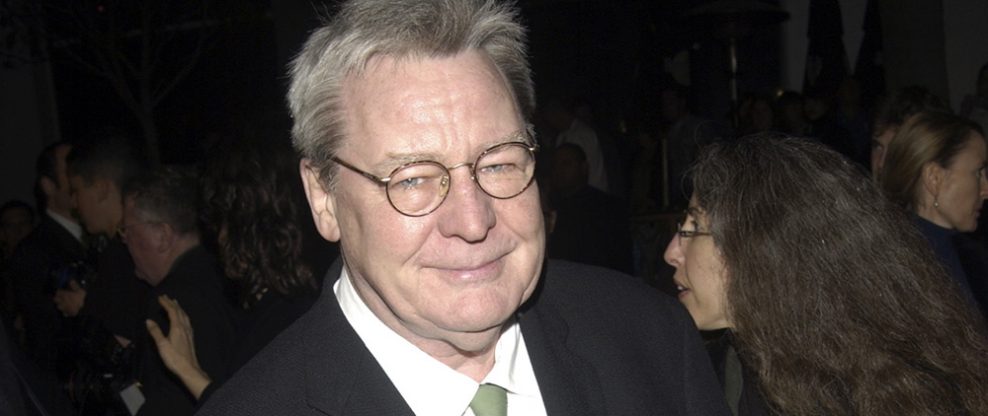LONDON (CelebrityAccess) — Alan Parker, an Oscar-nominated film director and writer who brought movies such as “Pink Floyd – The Wall,” “The Commitments,” and “Mississippi Burning,” to the big screen died in London on Friday. He was 76.
A spokeswoman for the British Film Institute told the New York Times that Parker died after a long illness. Additional details about his passing were not disclosed.
“Alan Parker was one of a kind. The brilliance of his filmmaking speaks for itself and for all time. Beautiful and breathtaking films, some that are charged for justice, others which are revealing through their intimacy, hope and humoir, part of the great canon of British films that continue to be loved by audiences all over the word. His Chairmanship of BFI, his support for our National Archive, and for championing British filmmaking is also an important part of his legancy for our industry, our film culture, and for the filmmakers who have been and will be inspired by his work,” Ben Roberts, BFI Chief Executive said in a statement following the announcement of Parker’s passing.
A native of Islington in North London, Parker’s landed his first job in the mail room of an advertising agency and quickly worked his way up to the position of copywriter at the agency.
After several years in the advertising business, he started writing scripts and successfully transitioned into directing television commercials, including award-winning spots such as a Cinzano vermouth ad which starred Joan Collins and Leonard Rossiter.
In 1973, he shot his first fictional film “No Hard Feelings” which was subsequently acquired by the BBC and show on television several years later.
His first feature film “Bugsy Malone” (1976) was a satirical take on the American prohibition-era gangster epic, featuring children cast in adult roles. While the film was not a commercial succes, it drew some praise from critics, including Roger Ebert, who described it as “Charming.”
While it didn’t land with audiences, the film received eight British Academy Award nominations and five Awards, including two BAFTAs for Jodie Foster, who was just 14 at the time.
Parker’s introduction to box office success came in 1978 when he directed “Midnight Express” which was based on the real life story of American William Hayes’ harrowing escape from a Turkish Prison after he was incercerated for drug smuggling.
“Midnight Express” was a critical and box office hit, and earned Parker his first nominations for an Oscar, including for best picture and director.
Parker developed a reputation for his use of music in his movies, starting with his 1980 film “Fame” which follows the lives of eight students at the New York City’s High School of Performing Arts.
The film, a modern take on the musicals of Hollywood’s golden age proved to be a smash hit and led to a successful television spin-off.
The following year, he directed “Pink Floyd – The Wall” an adaption of the band’s seminal 1979 album “The Wall” starring Bob Geldof in the lead role as Pink. While it saw only limited release in the U.S. and received mixed reviews, it went on to be a cult hit.
In 1988, Parker took on the American civil rights era with “Mississippi Burning,” which was loosely based on the 1964 FBI investigation of three civil rights workers murdered in Mississippi.
The film was a modest commercial success but earned Parker his second best picture nomination at the 61st annual Academy Awards, losing out to “Rainman” starring Dustin Hoffman.
In the 1990s, Parker took on the modern musical in two more films – “The Commitments” a story detailing the rise of a working class soul band in Dublin that eschewed an original soundtrack and instead relied on America’s classic soul songbook.
“The Commitments” featured 68 different musical cues and 52 songs, including 24 that were performed by the cast in the film. The Commitments’ soundtrack spent 76 weeks on the Billboard 200 and resulted in a 9-piece band featuring members of the original cast which continues to record and perform live today.
Parker also reworked the Tim Rice and Andrew Lloyd Webber concept album “Evita” featuring Madonna in a loose biography of Evita Perón, wife of Argentinian dictator Juan Perón.
The film, which cost roughly $55 million to produce, went on to earn more than $141 million from worldwide box offices.
In 1996, Parker his experiences with Madonna to British tabloid The Mirror, noting that she wasn’t always the easiest person to work with.
“My secret was to let her moan to my assistants to get it out of her system so that by the time she stepped in front of the camera she was all complained out,” he said.
In addition to his work behind the camera, Parker served as chairman of the Board of Governors of the British Film Institute (BFI) in 1998 and in 1999 was appointed the first chairman of the newly formed UK Film Council.
Parker was appointed Commander of the Order of the British Empire (CBE) in the 1995 Birthday Honours and Knight Bachelor in the 2002 New Year Honours for services to the film industry.
According to the New York Times, Parker is survived by his second wife, Lisa Moran-Parke; five children; and seven grandchildren.
He was previously married to Annie Inglis, with whom he had four children.

























































